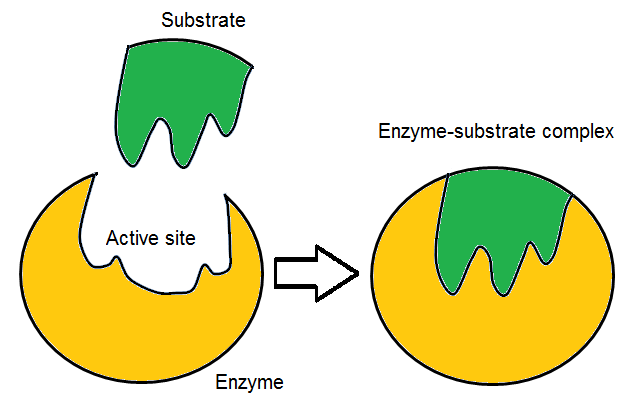
What is an enzyme substrate complex?
Answer
515.7k+ views
Hint: A non covalent complex composed of a substrate bound to the active site of the enzyme is known as enzyme-substrate complex. It forms during chemical reaction and the intermediate is formed when a substrate molecule interacts with the active site of an enzyme. There are various mechanisms for the formation of enzyme substrate complexes.
Complete answer:-
To answer this question you must know all about enzymes.
ENZYME:- enzymes are the biological macromolecular catalysts which accelerate the rate of reaction to yield the desired product.
ENZYME SUBSTRATE:- substrate is the molecule upon which a molecule acts. Enzymes must bid to their substrate before they can catalyse any chemical reaction.
ENZYME SUBSTRATE COMPLEX:- it is a non covalent complex composed of a substrate bound to the active site of the enzyme and it is formed during chemical reaction. The substrate bound to the small area of the enzyme is called the active site of the enzyme.
A theory to explain the catalytic action of enzymes was proposed by the Swedish chemist Arrhenius in 1888. He proposed that the substrate and enzymes formed some intermediate substance called as enzyme substrate complex the reaction can be represented as :
E (enzyme) + S (substrate) --> ES (Enzyme-substrate complex)

Note:-
Enzymes are not able to function if they bond with the correct substrate. Enzymes are highly selective; they will activate with one and only one particular substrate and the most important enzymes are vital for life and serve a wide range of important functions in the body such as aiding in digestion and metabolism.
Complete answer:-
To answer this question you must know all about enzymes.
ENZYME:- enzymes are the biological macromolecular catalysts which accelerate the rate of reaction to yield the desired product.
ENZYME SUBSTRATE:- substrate is the molecule upon which a molecule acts. Enzymes must bid to their substrate before they can catalyse any chemical reaction.
ENZYME SUBSTRATE COMPLEX:- it is a non covalent complex composed of a substrate bound to the active site of the enzyme and it is formed during chemical reaction. The substrate bound to the small area of the enzyme is called the active site of the enzyme.
A theory to explain the catalytic action of enzymes was proposed by the Swedish chemist Arrhenius in 1888. He proposed that the substrate and enzymes formed some intermediate substance called as enzyme substrate complex the reaction can be represented as :
E (enzyme) + S (substrate) --> ES (Enzyme-substrate complex)

Note:-
Enzymes are not able to function if they bond with the correct substrate. Enzymes are highly selective; they will activate with one and only one particular substrate and the most important enzymes are vital for life and serve a wide range of important functions in the body such as aiding in digestion and metabolism.
Recently Updated Pages
Master Class 11 Business Studies: Engaging Questions & Answers for Success

Master Class 11 Computer Science: Engaging Questions & Answers for Success

Master Class 11 Economics: Engaging Questions & Answers for Success

Master Class 11 Social Science: Engaging Questions & Answers for Success

Master Class 11 English: Engaging Questions & Answers for Success

Master Class 11 Chemistry: Engaging Questions & Answers for Success

Trending doubts
Draw a diagram of nephron and explain its structur class 11 biology CBSE

Explain zero factorial class 11 maths CBSE

Chemical formula of Bleaching powder is A Ca2OCl2 B class 11 chemistry CBSE

One Metric ton is equal to kg A 10000 B 1000 C 100 class 11 physics CBSE

A solution of a substance X is used for white washing class 11 chemistry CBSE

Differentiate between calcination and roasting class 11 chemistry CBSE




